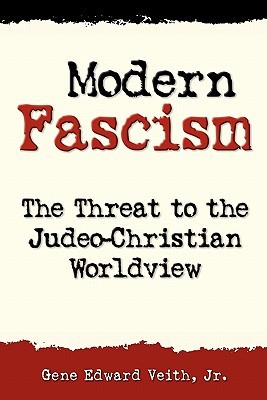In an essay on Nietzsche written in 1947, Thomas Mann spoke of “the fascist epoch of the West” in which “we are living and, despite the military victory over fascism, shall continue to live for a long time.” Gene Edward Veith, Jr., dean of the College of Arts and Sciences at Concordia University of Wisconsin in Mequon, Wisconsin, agrees with Mann, for, in his opinion, there are a striking number of parallels between fascism and contemporary intellectual life.
The only definition of fascism Veith offers is that of the historian and philosopher Ernst Nolte, who sees it as “practical and violent resistance to transcendence.” Simplifying slightly, we may say that by transcendence Nolte means man’s experience of God. But this definition is as applicable to communism as it is to fascism, and Veith fails to distinguish adequately between the latter and other ways of thinking. Moreover, it is sometimes unclear whether Veith is talking about fascism as a whole or just German National Socialism. Veith is especially concerned for the current intellectual movement known as postmodernism, with its relativism, its disparagement of humane values, its attempt to reduce all human creativity to questions of power relations, and its refusal to deal with questions of transcendence. On all these points postmodernism parallels fascism. Veith does not consider postmodernists to be fascists, but he fears that they may be paving the way for the accession to power of a fascist regime in the United States.
As a conservative Lutheran, Veith also sees parallels between contemporary theology and the German Christians, who sought to reconcile Christianity with National Socialism. He writes:
Consider these recurring themes of modern theology: the relationship between culture and Christianity; a “this-worldly” focus versus “other-worldly” salvationism; subjective experience versus objective doctrine; Biblical criticism versus Biblical authority. The debates over these issues developed throughout the 19th century, as fascist ideology was also taking form. In each ease the “modernist” positions on these issues were also the position taken by the German Christian movement: the privileging of culture, the politicization of the Gospel, the minimizing of doctrine, the criticism of Biblical authority.
Veith’s book is valuable, but it would have been better if he had gone beyond the ideologies of fascism and contemporary intellectualism and looked at the underlying consciousness of those who espouse these beliefs. Had Veith done so, he would have had to come to terms with Eric Voegelin’s work on gnosticism. For gnosticism pervaded the fascist and communist states, and it pervades contemporary Western society, including those parts whose views parallel fascism’s. It is a more powerful concept than “fascism,” for it shows what is at the base of fascism and also of much other modern thought.
Our problems are therefore greater than Veith realizes. Further evidence of this is the brief attention he pays to Thomas Mann’s last great novel, Doctor Faustus. It is the tragedy of a man who can neither believe nor love, a composer who enters into a Faustian pact for the sake of his art. His philosophy and life are modeled on those of Nietzsche; his music on that of Arnold Schonberg.
Although Veith discusses Igor Stravinsky’s ballet The Rites of Spring as a paradigm for fascism, he fails to mention Schonberg’s transvaluation of musical values as a symbol of the same thing. In short, Veith does not press far enough in diagnosing the Western crisis, nor does he come right out and say that the only thing that can save the West from future totalitarian regimes is a renaissance of traditional religion among the intellectual elite.
[Modern Fascism: Liquidating the Judeo-Christian Worldview, by Gene Edward Veith, Jr. (St. Louis: Concordia Publishing House) 187 pp., $15.95]

Leave a Reply